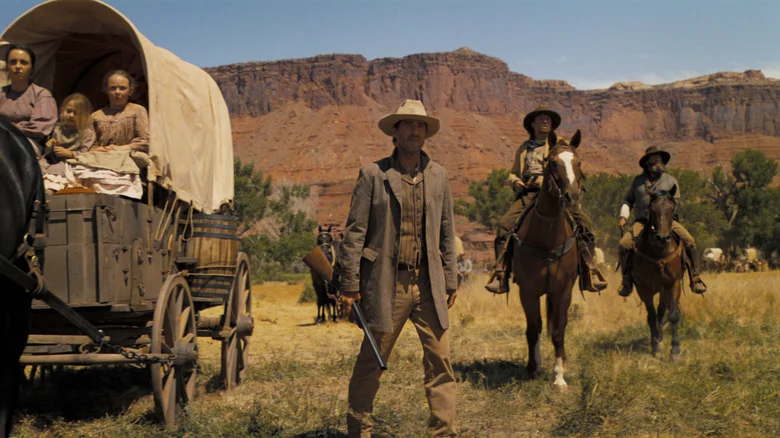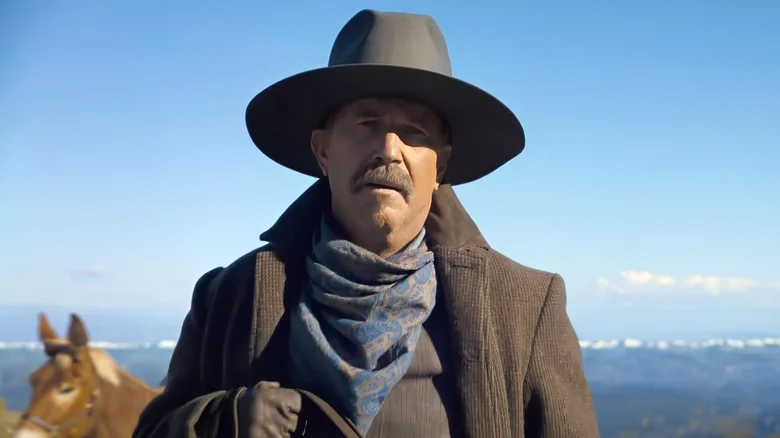As it stands, Kevin Costner’s “Horizon: An American Saga – Chapter 1” is going to go down as one of the year’s biggest box office misfires. While Costner’s ambitious plan to make an uncompromising, four-film Western saga certainly seemed appealing, it just hasn’t panned out from a commercial standpoint. To date, the first film has made just $29 million at the domestic box office, with only a few million coming from overseas thus far. For a movie with a $100 million budget, and the similarly expensive “Chapter 2” already in the can, that’s a bad look. “Horizon” is finding new life on VOD, which is certainly good news for Costner and all involved. But is that going to be enough to truly turn the tide?
“Horizon: An American Saga – Chapter 1” is currently sitting at number one on the iTunes and Fandango at Home movie charts, per IndieWire. It’s currently above other recent releases such as “Kingdom of the Planet of the Apes,” “The Bikeriders,” and “The Garfield Movie.” It’s also currently priced at $19.99, which is the standard premium VOD rate in the pandemic era. Adding up all of those transactions, that’s a lot of money, no two ways about it. That makes Warner Bros. and Costner look wise for delaying “Horizon Chapter 2,” as the sequel was originally scheduled to hit theaters on August 16.

The reasoning cited at the time by Costner’s company Territory Pictures was “to give audiences a greater opportunity to discover the first installment,” specifically citing VOD and an eventual streaming release on Max for people to do just that. Well, in the early going, that’s working. That’s certainly a win for a film that could use a win. Be that as it may, there is a massive windfall that Costner and his investors still need to make up, even with a lot of people catching up with the film at home.
VOD can’t possibly make up for what Horizon is set to lose
VOD does complicate the math a bit because studios don’t report how many times a movie was rented/sold on these various digital platforms. On the plus side, studios do keep a lot more of the revenue made from those purchases, as opposed to the roughly 50% of theatrical ticket sales that would go back to Costner and his investors.

Box office is relatively straightforward in many ways. We can look at how much a movie made in theaters, weigh that against the reported budget, reasonably estimate the marketing costs, and figure out where a movie stands. The way box office works largely hasn’t changed, even if the media landscape has shifted dramatically in recent years. In this case, a $100 million budget plus — very conservatively — $30 million or more for marketing means there’s a huge gap that needs to be made up.
Warner Bros. was only on the hook for distribution, and wasn’t even paying for marketing. Costner put up nearly $40 million of his own money to finance these films, and he also has a couple of mystery investors. While he had no illusions about “Horizon” facing an uphill battle, we’re talking about tens of millions in losses even when accounting for VOD. Costner had better hope that a lot of people buy “Horizon” on DVD, that much is certain.
Here’s the bottom line: The box office isn’t the only determining factor for a movie. Most movies don’t profit purely in theaters alone. However, when a movie still needs to make up a $100 million gap after its theatrical run, not to mention promote that movie’s $100 million sequel, VOD isn’t reasonably going to be able to make up the difference, at least not in the short term. At the very least, this undoubtedly complicates matters for Costner’s sequels, which are already well underway.
“Horizon: An American Saga – Chapter 1” is in theaters and available on VOD now.
